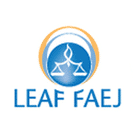On June 1, 2015, LEAF filed a motion for leave to intervene in Canada (Minister of Citizenship and Immigration) v. Ishaq at the Federal Court of Appeal. Zunera Ishaq has fulfilled all of the requirements to become a Canadian citizen except to swear the citizenship oath. She is a niqab-wearing Muslim woman. Citizenship and Immigration Canada (CIC) issued a policy in late 2011 stating that citizenship candidates must remove facial coverings during the oath-taking portion of the ceremony, or they will not receive their certificates of citizenship. Ishaq successfully challenged the CIC policy in Federal Court but the Crown is now appealing the Federal Court’s decision.
State control or regulation of women’s clothing, including religious attire, disadvantages all women. Historically, a woman’s clothing has been interpreted as an indicium of her trustworthiness and character. Sexual assault complainants were evaluated as victim-worthy and credible based on their dress or demeanour. The policy assumes that women who wear a niqab are not only more able (because of their veils), but also more likely (because of some unnamed inherent quality), than other citizenship candidates to defraud the oath. Based on stereotypical views of her clothing, the policy forces a woman to choose between denying who she is and foregoing citizenship.
Laws and policies that implicitly or explicitly create distinctions and disadvantages for certain groups in Canada are at odds with s. 15(1) Charter substantive equality rights. The intersection of multiple identities, including those of religion and gender, should be considered in order to understand how otherwise neutral laws and policies can have a distinctly adverse impact upon certain groups of women. In this case, niqab-wearing immigrant Muslim women, whose religious beliefs conflict with the policy, are effectively denied Canadian citizenship. This means that this group of women is denied the right to vote, and is assigned to the more precarious state of permanent residency, all because the state is seeking to dictate how they dress.
The Policy disadvantages women by disenfranchising them. The struggle for suffrage has historically been both gendered and racialized, with women only attaining full suffrage in Canada in 1960 when Aboriginal women were finally afforded the right to vote. The disenfranchisement of women – who are otherwise qualified to be citizens – because of what they wear excludes women from our democratic institutions and diminishes all women’s equality rights. Women’s voices are silenced when they are denied the right to vote and participate fully in Canadian public life by seeking public office. The appellant’s prohibition of the niqab effectively shuts out niqab-wearing women from Canadian democratic processes contrary to ss. 2(a) and 15 of the Charter and the constitutional principles of democracy, constitutionalism and the rule of law, and respect for minorities.
The Policy exacerbates barriers already faced by women in immigration and citizenship processes, and vulnerabilities as a result of their precarious immigration status. Immigrant women are more likely to face poverty, are more vulnerable to intimate-partner violence (especially if sponsored by a spouse), and may face language and cultural challenges in accessing services or employment. A denial of citizenship to otherwise-qualified immigrant women only aggravates these conditions and enhances inequality.
This appeal raises issues that go to the core of LEAF’s experience, namely the specific gendered impacts of discriminatory laws and policies and, in particular, the effects on individuals like Muslim women, who experience discrimination on multiple grounds and are subject to greater effects of inequality.
Over the last 30 years, LEAF has contributed to substantive equality rights in a number of cases, including advocating for the rights of Muslim women in Canada. For example, LEAF intervened at the Supreme Court of Canada in R. v. N.S., to argue that niqab-wearing women should not face additional barriers to accessing justice when they wish to testify in sexual assault trials. LEAF called for the withdrawal of Bill 94 and later the Charter of Values in Québec, and more recently hosted a public event as part of an ongoing project on the intersection of religion and equality rights.
For more information about our proposed intervention in Ishaq, please see our motion materials.
Updates
On October 5, 2015, the Federal Court of Appeal dismissed the government’s application for a stay of the decision allowing Ms. Ishaq to wear her niqab to a citizenship ceremony. The government had sought to put the Federal Court of Appeal’s recent decision in favour of Ms. Ishaq on hold while it seeks an appeal to the Supreme Court of Canada. Justice Trudel decided that the government had not demonstrated that refusing the application for a stay would result in irreparable harm to the public interest. Justice Trudel’s reasons are available here.
The Minister of Citizenship and Immigration objected to LEAF’s motion for leave to intervene. LEAF filed a reply to CIC’s response on June 16, 2015. The court released its decision denying leave to all proposed interveners on June 23, 2015. For more information on that decision, see our statement here.

